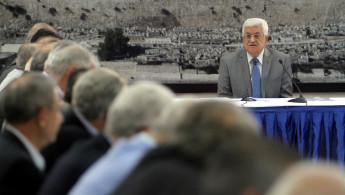Hamas shies away from Palestinian central council summit
Hamas appears ready to boycott or at least shy away from the meeting of the Palestinian Central Council in Ramallah.
The meetings on Wednesday and Thursday are discussing the threat by the Palestinian Authority to stop security coordination with Israel.
Ayman Daraghmeh is a Hamas member of the Palestinian Legislative Council, the would-be parliament of a future Palestinian state. The PLC has been unable to meet since the internecine Fatah-Hamas violence of 2007, and elections to the body have been indefinitely postponed by the Fatah leadership in the PA.
"I received an invitation to attend the PCC meeting, but I will not go because all the institutions of the Palestinian political system need re-evaluation through elections," he told al-Araby.
"I will boycott the meetings because the one who can convene the central council can activate the legislative council (PLC) and convene the leadership body of the Palestine Liberation Organisation."
He said that "the absence of the PLC inflicted a significant damage on the Palestinian political fabric".
"If there has been goodwill to activate the institutions of Palestinian society, activation of the PLC first would be the most important."
Consensus
When asked whether there was a consensus among the Hamas PLC members on boycotting the PCC session, Daraghmeh said: "We did not hold consultations among us as PLC members on whether to attend or not, but since 2007 we have a clear position focusing on why the PLC is being deactivated. On this basis we boycott the PCC.
| Abbas is the one who has the authority to invite a new session and activate the PLC, but he doesn't. - Ayman Daraghmeh, Hamas member |
"Palestinian President Mahmoud Abbas is the one who has the authority to invite a new session and activate the PLC, but he doesn't," Daraghmeh said.
"There is another institution which is more important than the PCC, namely the united leadership body [of the PLO]; it did not meet at all because there is no will to activate it despite the fact that it includes all spectra and components of the Palestinian society... I don't see that there will be a commitment to the PCC resolutions."
Invitations to the PCC summit were sent to Hamas members chairs of PLC committees and members of the PLC presidency, as such positions are normally considered members of the PCC.
Observation
Samir Abu Eisheh, a senior member of Hamas, said he and others would attend the PCC meeting as "observers".
Abu Eisheh told al-Araby: "I was invited as a national figure and not on a political basis, as I have no relations with any organisation."
| I was invited as a national figure and not on a political basis, as I have no relations with any organisation. Samir Abu Eisheh, Hamas member |
Invitations were sent to 110 PCC members from the West Bank, Gaza Strip and the diaspora. Israeli officials prevented four members from entering to Ramallah to participate in the meetings, sources told al-Araby.
The 27th ordinary session of the PCC was opened by Abbas on Wednesday with a report from the PLO's executive committee.
The PLO executive committee member Wasel Abu Yousef told al-Araby the agenda includes several important issues, the first of which is to follow-up on the international campaign to recognising the state of Palestine, in addition to discussing Israeli political developments and the expansion of illegal settlements.
The situation in occupied Jerusalem and the activation of popular resistance will also be discussed. But the headlines will be grabbed by a review of security cooperation with Israel and an examination of the pair's economic relationship in light of Tel Aviv's withholding of Palestinian tax revenues.
The fates of Palestinian prisoners of Israel and refugees in Syria and Lebanon is also on the meeting's agenda.
This is an edited translation from our Arabic edition.



